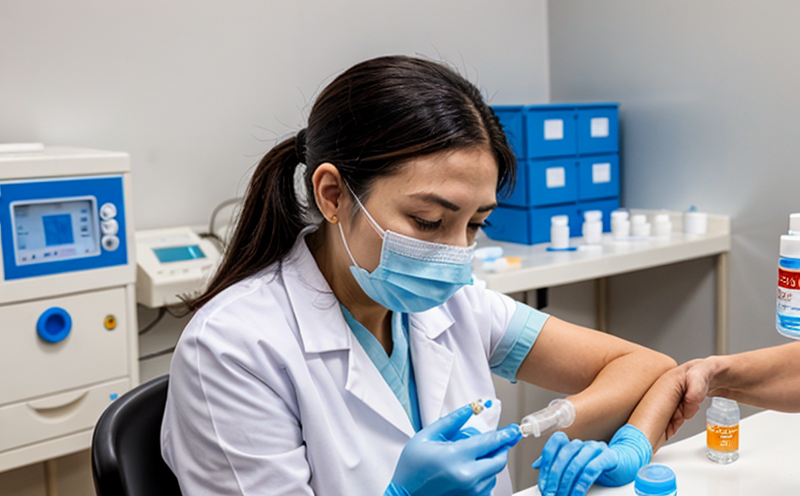WHO Freeze Sensitivity Testing of Vaccines
The World Health Organization (WHO) Freeze Sensitivity Test is a critical procedure used to evaluate the stability and quality assurance of vaccines under controlled freeze-thaw conditions. This test is pivotal in ensuring that vaccines maintain their immunogenicity, efficacy, and safety throughout storage, transportation, and administration. The WHO recommends this testing for various vaccine types including subunit vaccines, viral vector-based vaccines, and live attenuated vaccines to ensure they remain effective even after repeated freeze-thaw cycles.
The test is particularly important in regions where temperature-controlled storage facilities are limited or unavailable. By simulating real-world conditions, the WHO Freeze Sensitivity Test helps identify potential stability issues that could arise during transport from manufacturing plants to remote healthcare settings. The procedure involves exposing the vaccine to controlled freeze and thaw cycles while monitoring critical parameters such as pH changes, viscosity alterations, and protein aggregation.
The test protocol strictly adheres to ISO standards and guidelines provided by WHO. It requires specific equipment like a programmable freezer with temperature control capabilities and an incubator for the recovery phase after freezing. The vaccine samples are subjected to multiple freeze-thaw cycles over a specified period, typically ranging from 10-25 cycles depending on the type of vaccine.
The acceptance criteria include assessing the physical integrity of the vaccine vial, checking for any visible changes in appearance or clarity, and evaluating the stability of critical components. The test also involves measuring the immunogenicity of the vaccine post-freeze-thaw to ensure that it remains effective in triggering an immune response.
In terms of real-world application, this testing is essential for pharmaceutical companies looking to meet regulatory requirements set by various health authorities worldwide. It ensures that vaccines remain stable and efficacious under harsh conditions which are common in less developed regions or during emergency situations such as pandemics.
- Ensures vaccine stability: By simulating real-world storage and transportation conditions, this test helps ensure vaccine integrity.
- Promotes compliance: Adherence to WHO guidelines ensures that vaccines meet international standards and can be safely distributed globally.
- Supports innovation: The test allows for continuous improvement in vaccine formulations and delivery methods, enhancing overall efficacy and safety.
Applied Standards
The WHO Freeze Sensitivity Test strictly follows the guidelines provided by the World Health Organization (WHO) as well as international standards such as ISO 10774-3:2015 and ICH Q6A. These standards are crucial in ensuring that the freeze-thaw cycles accurately reflect real-world conditions, thereby providing reliable data on vaccine stability.
ISO 10774-3:2015 provides detailed specifications for the preparation of vaccines and biologicals, including the freeze-drying process, which is often a crucial step in vaccine manufacturing. ICH Q6A offers guidance on the quality aspects of biotechnological/biological products, emphasizing the importance of stability testing throughout the product lifecycle.
These standards ensure that the freeze sensitivity test not only meets regulatory requirements but also provides robust data for decision-making processes within pharmaceutical companies and regulatory bodies. Compliance with these guidelines is mandatory to obtain approval from health authorities such as the FDA, EMA, or WHO.
Why Choose This Test
- Increased Safety: Ensures that vaccines remain safe and effective even after repeated freeze-thaw cycles, reducing the risk of side effects due to instability.
- Better Compliance: Adheres strictly to WHO guidelines, ensuring compliance with international standards and regulations.
- Enhanced Reputation: Demonstrates a commitment to quality and reliability, enhancing the reputation of pharmaceutical companies.
The test is crucial for maintaining high-quality vaccine production processes. By identifying potential stability issues early in development or during manufacturing, this testing helps prevent costly recalls and ensures that vaccines are safe and effective when administered.
Environmental and Sustainability Contributions
The WHO Freeze Sensitivity Test plays a significant role in promoting environmental sustainability within the pharmaceutical industry. By ensuring that vaccines remain stable under adverse conditions, this test helps reduce waste associated with ineffective or unstable products. This contributes to a more efficient use of resources during vaccine production and distribution.
Furthermore, by adhering strictly to international standards such as ISO 10774-3:2015 and ICH Q6A, the test promotes a culture of quality and reliability that is essential for sustainable development. This ensures that vaccines are not only effective but also environmentally responsible.
The test supports sustainability by minimizing the environmental impact associated with the production and distribution of unstable vaccine batches. It encourages pharmaceutical companies to adopt practices that reduce waste and improve overall efficiency, contributing positively to global sustainability goals.





